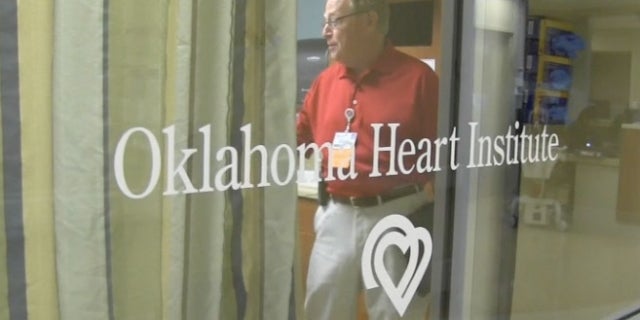Cardiologists and health care providers agree that there are things within our control and things outside of our control when it comes to reducing the risk of having a heart attack. These modifiable and non-modifiable risk factors give us our own individual risk for having a heart attack. While some of us may work really hard to control modifiable risk factors like hypertension, none of us are able to control getting older, for example. Together with our health care team, we work to change what we can, reduce our risk and stay on top of any changes to help prevent a cardiovascular event.... Read More »
Blog

In 2013, Oklahoma Heart Institute joined institutions from around the world celebrating World Atrial Fibrillation (AFib) Awareness Day at our AFib and Yoga seminar and yoga session. It was a great success and this year we are happy to announce cardiac electrophysiologist Dr. David Sandler is taking the Oklahoma Heart Institute AFib and Yoga seminar to the outdoor stage at Lululemon Community Yoga at Guthrie Green Wednesday, September 10, 2014. Dr. Sandler will talk about the benefits of yoga for those who suffer from AFib and the latest research, led by colleague and friend, Dr. DJ... Read More »

For the 67 million Americans with high blood pressure, they may not feel any different when their blood pressure is elevated. Often referred to as the “silent killer” hypertension, or high blood pressure, usually has no warning signs or symptoms. That is why it is important to have regular physical exams with your primary care physician to be aware of any changes in your blood pressure – a leading risk factor for heart disease and stroke. If you are diagnosed with hypertension, your PCP or cardiologist may recommend that you monitor your blood pressure on a more regular basis at home with... Read More »
The TAVR team at Oklahoma Heart Institute led by Dr. Kamran Muhammad, Dr. Wayne Leimbach and Dr. Michael Phillips recently performed the 100th successful Transcatheter Aortic Valve Replacement (TAVR) in Tulsa, OK. See how this program is not only helping patients in Oklahoma relieve their symptoms of severe aortic stenosis, but improve their quality of life.

Don’t have time to exercise? It is understandably one of the biggest obstacles in our busy lifestyles to maintaining a regular exercise regime. However, what if carving our a mere five to ten minutes a day could give you additional years of life in return? Would you find the time? In the largest, most comprehensive study examining the long-term benefits of running on reducing all-cause mortality researchers found that running just a short amount of time each daysignificantly reduced the risk of death from all causes and for cardiovascular cause of death.
The 15-year study included... Read More »

Vascular disease can be complex and require a collaborative approach from multiple specialists for the best outcomes. The circulatory system consists of a network of organs and vessels, which feed the rest of the body with nutrients, blood, oxygen and other gases and hormones. The vascular system alone accounts for nearly 100,000 miles of blood vessels, when stretched end-to-end, in adults. Understanding and treating conditions of the veins, arteries and capillaries requires good teamwork.
The Vascular Center at Oklahoma Heart Institute provides patients suffering from a variety of... Read More »

Oklahoma Heart Institute was the first in Oklahoma to use the Edwards Sapien XT valve for commercial use in a Transcatheter Aortic Valve Replacement (TAVR) procedure June 24, 2014. The team was lead by Drs. Kamran Muhammad, Paul Kempe, Wayne Leimbach, and Victor Cheng. Go inside the case to see how this valve will help more patients with severe aortic stenosis who are high-risk or inoperable.
(Image courtesy of Edwards)

Gene Swepston is no stranger to Oklahoma Heart Institute. The marketing vendor who supplies various items such as the cough buddy, was admitted to the hospital in February of 2014. He shares his story and why he returned as soon as he was able to volunteer and help other patients.

David Hubbard, 50, pays close attention to detail. The associate-senior project manager with a local architectural firm easily recalls the month-long journey from hospitals, Emergency Departments, doctors’ offices and operating rooms that led to a tearful exchange between his wife, Pam, and Oklahoma Heart Institute cardiologist Dr. Kyle Zimmerman. “They hugged and cried a bit,” David adds. “He described it as an astonishing fourth quarter victory.”
It all started in March when David woke up in pain. “I thought initially I had slept wrong and was having a spasm, but soon I realized I... Read More »

Heart disease is number one when it comes to leading causes of death for men in the United States. In 2009, more than 307,000 men died of heart disease, which adds up to 1 in 4 male deaths. Furthermore, heart disease is the number one cause of death in Oklahoma. About 9,426 people in Oklahoma died of heart disease in 2010.
So what does this mean and what can you do to improve your heart health?
Heart disease is an all-encompassing term for diseases that affect your heart. These diseases can include coronary artery disease (CAD), arrhythmias, heart infections and heart defects... Read More »

